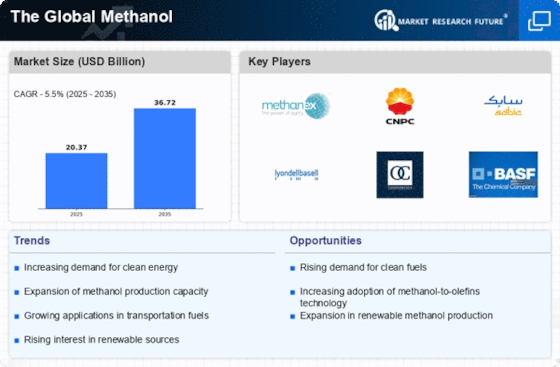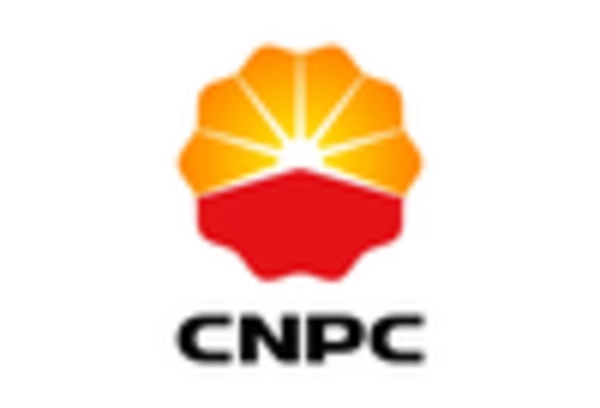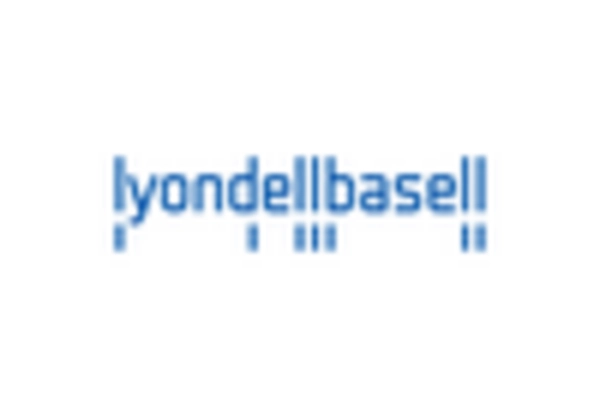Fuel
Chemical Feedstock
Solvent
Reducing Agent
Antifreeze
Automotive
Construction
Agriculture
Electronics
Pharmaceuticals
Natural Gas Reforming
Coal Gasification
Biomass Gasification
Recycling
Others
Liquid
Gas
Solid
North America
Europe
South America
Asia Pacific
Middle East and Africa
North America Outlook (USD Billion, 2019-2035)
North America Methanol Market by Application Type
Fuel
Chemical Feedstock
Solvent
Reducing Agent
Antifreeze
North America Methanol Market by End Use Industry Type
Automotive
Construction
Agriculture
Electronics
Pharmaceuticals
North America Methanol Market by Production Method Type
Natural Gas Reforming
Coal Gasification
Biomass Gasification
Recycling
Others
North America Methanol Market by Form Type
Liquid
Gas
Solid
North America Methanol Market by Regional Type
US
Canada
US Outlook (USD Billion, 2019-2035)
US Methanol Market by Application Type
Fuel
Chemical Feedstock
Solvent
Reducing Agent
Antifreeze
US Methanol Market by End Use Industry Type
Automotive
Construction
Agriculture
Electronics
Pharmaceuticals
US Methanol Market by Production Method Type
Natural Gas Reforming
Coal Gasification
Biomass Gasification
Recycling
Others
US Methanol Market by Form Type
Liquid
Gas
Solid
CANADA Outlook (USD Billion, 2019-2035)
CANADA Methanol Market by Application Type
Fuel
Chemical Feedstock
Solvent
Reducing Agent
Antifreeze
CANADA Methanol Market by End Use Industry Type
Automotive
Construction
Agriculture
Electronics
Pharmaceuticals
CANADA Methanol Market by Production Method Type
Natural Gas Reforming
Coal Gasification
Biomass Gasification
Recycling
Others
CANADA Methanol Market by Form Type
Liquid
Gas
Solid
Europe Outlook (USD Billion, 2019-2035)
Europe Methanol Market by Application Type
Fuel
Chemical Feedstock
Solvent
Reducing Agent
Antifreeze
Europe Methanol Market by End Use Industry Type
Automotive
Construction
Agriculture
Electronics
Pharmaceuticals
Europe Methanol Market by Production Method Type
Natural Gas Reforming
Coal Gasification
Biomass Gasification
Recycling
Others
Europe Methanol Market by Form Type
Liquid
Gas
Solid
Europe Methanol Market by Regional Type
Germany
UK
France
Russia
Italy
Spain
Rest of Europe
GERMANY Outlook (USD Billion, 2019-2035)
GERMANY Methanol Market by Application Type
Fuel
Chemical Feedstock
Solvent
Reducing Agent
Antifreeze
GERMANY Methanol Market by End Use Industry Type
Automotive
Construction
Agriculture
Electronics
Pharmaceuticals
GERMANY Methanol Market by Production Method Type
Natural Gas Reforming
Coal Gasification
Biomass Gasification
Recycling
Others
GERMANY Methanol Market by Form Type
Liquid
Gas
Solid
UK Outlook (USD Billion, 2019-2035)
UK Methanol Market by Application Type
Fuel
Chemical Feedstock
Solvent
Reducing Agent
Antifreeze
UK Methanol Market by End Use Industry Type
Automotive
Construction
Agriculture
Electronics
Pharmaceuticals
UK Methanol Market by Production Method Type
Natural Gas Reforming
Coal Gasification
Biomass Gasification
Recycling
Others
UK Methanol Market by Form Type
Liquid
Gas
Solid
FRANCE Outlook (USD Billion, 2019-2035)
FRANCE Methanol Market by Application Type
Fuel
Chemical Feedstock
Solvent
Reducing Agent
Antifreeze
FRANCE Methanol Market by End Use Industry Type
Automotive
Construction
Agriculture
Electronics
Pharmaceuticals
FRANCE Methanol Market by Production Method Type
Natural Gas Reforming
Coal Gasification
Biomass Gasification
Recycling
Others
FRANCE Methanol Market by Form Type
Liquid
Gas
Solid
RUSSIA Outlook (USD Billion, 2019-2035)
RUSSIA Methanol Market by Application Type
Fuel
Chemical Feedstock
Solvent
Reducing Agent
Antifreeze
RUSSIA Methanol Market by End Use Industry Type
Automotive
Construction
Agriculture
Electronics
Pharmaceuticals
RUSSIA Methanol Market by Production Method Type
Natural Gas Reforming
Coal Gasification
Biomass Gasification
Recycling
Others
RUSSIA Methanol Market by Form Type
Liquid
Gas
Solid
ITALY Outlook (USD Billion, 2019-2035)
ITALY Methanol Market by Application Type
Fuel
Chemical Feedstock
Solvent
Reducing Agent
Antifreeze
ITALY Methanol Market by End Use Industry Type
Automotive
Construction
Agriculture
Electronics
Pharmaceuticals
ITALY Methanol Market by Production Method Type
Natural Gas Reforming
Coal Gasification
Biomass Gasification
Recycling
Others
ITALY Methanol Market by Form Type
Liquid
Gas
Solid
SPAIN Outlook (USD Billion, 2019-2035)
SPAIN Methanol Market by Application Type
Fuel
Chemical Feedstock
Solvent
Reducing Agent
Antifreeze
SPAIN Methanol Market by End Use Industry Type
Automotive
Construction
Agriculture
Electronics
Pharmaceuticals
SPAIN Methanol Market by Production Method Type
Natural Gas Reforming
Coal Gasification
Biomass Gasification
Recycling
Others
SPAIN Methanol Market by Form Type
Liquid
Gas
Solid
REST OF EUROPE Outlook (USD Billion, 2019-2035)
REST OF EUROPE Methanol Market by Application Type
Fuel
Chemical Feedstock
Solvent
Reducing Agent
Antifreeze
REST OF EUROPE Methanol Market by End Use Industry Type
Automotive
Construction
Agriculture
Electronics
Pharmaceuticals
REST OF EUROPE Methanol Market by Production Method Type
Natural Gas Reforming
Coal Gasification
Biomass Gasification
Recycling
Others
REST OF EUROPE Methanol Market by Form Type
Liquid
Gas
Solid
APAC Outlook (USD Billion, 2019-2035)
APAC Methanol Market by Application Type
Fuel
Chemical Feedstock
Solvent
Reducing Agent
Antifreeze
APAC Methanol Market by End Use Industry Type
Automotive
Construction
Agriculture
Electronics
Pharmaceuticals
APAC Methanol Market by Production Method Type
Natural Gas Reforming
Coal Gasification
Biomass Gasification
Recycling
Others
APAC Methanol Market by Form Type
Liquid
Gas
Solid
APAC Methanol Market by Regional Type
China
India
Japan
South Korea
Malaysia
Thailand
Indonesia
Rest of APAC
CHINA Outlook (USD Billion, 2019-2035)
CHINA Methanol Market by Application Type
Fuel
Chemical Feedstock
Solvent
Reducing Agent
Antifreeze
CHINA Methanol Market by End Use Industry Type
Automotive
Construction
Agriculture
Electronics
Pharmaceuticals
CHINA Methanol Market by Production Method Type
Natural Gas Reforming
Coal Gasification
Biomass Gasification
Recycling
Others
CHINA Methanol Market by Form Type
Liquid
Gas
Solid
INDIA Outlook (USD Billion, 2019-2035)
INDIA Methanol Market by Application Type
Fuel
Chemical Feedstock
Solvent
Reducing Agent
Antifreeze
INDIA Methanol Market by End Use Industry Type
Automotive
Construction
Agriculture
Electronics
Pharmaceuticals
INDIA Methanol Market by Production Method Type
Natural Gas Reforming
Coal Gasification
Biomass Gasification
Recycling
Others
INDIA Methanol Market by Form Type
Liquid
Gas
Solid
JAPAN Outlook (USD Billion, 2019-2035)
JAPAN Methanol Market by Application Type
Fuel
Chemical Feedstock
Solvent
Reducing Agent
Antifreeze
JAPAN Methanol Market by End Use Industry Type
Automotive
Construction
Agriculture
Electronics
Pharmaceuticals
JAPAN Methanol Market by Production Method Type
Natural Gas Reforming
Coal Gasification
Biomass Gasification
Recycling
Others
JAPAN Methanol Market by Form Type
Liquid
Gas
Solid
SOUTH KOREA Outlook (USD Billion, 2019-2035)
SOUTH KOREA Methanol Market by Application Type
Fuel
Chemical Feedstock
Solvent
Reducing Agent
Antifreeze
SOUTH KOREA Methanol Market by End Use Industry Type
Automotive
Construction
Agriculture
Electronics
Pharmaceuticals
SOUTH KOREA Methanol Market by Production Method Type
Natural Gas Reforming
Coal Gasification
Biomass Gasification
Recycling
Others
SOUTH KOREA Methanol Market by Form Type
Liquid
Gas
Solid
MALAYSIA Outlook (USD Billion, 2019-2035)
MALAYSIA Methanol Market by Application Type
Fuel
Chemical Feedstock
Solvent
Reducing Agent
Antifreeze
MALAYSIA Methanol Market by End Use Industry Type
Automotive
Construction
Agriculture
Electronics
Pharmaceuticals
MALAYSIA Methanol Market by Production Method Type
Natural Gas Reforming
Coal Gasification
Biomass Gasification
Recycling
Others
MALAYSIA Methanol Market by Form Type
Liquid
Gas
Solid
THAILAND Outlook (USD Billion, 2019-2035)
THAILAND Methanol Market by Application Type
Fuel
Chemical Feedstock
Solvent
Reducing Agent
Antifreeze
THAILAND Methanol Market by End Use Industry Type
Automotive
Construction
Agriculture
Electronics
Pharmaceuticals
THAILAND Methanol Market by Production Method Type
Natural Gas Reforming
Coal Gasification
Biomass Gasification
Recycling
Others
THAILAND Methanol Market by Form Type
Liquid
Gas
Solid
INDONESIA Outlook (USD Billion, 2019-2035)
INDONESIA Methanol Market by Application Type
Fuel
Chemical Feedstock
Solvent
Reducing Agent
Antifreeze
INDONESIA Methanol Market by End Use Industry Type
Automotive
Construction
Agriculture
Electronics
Pharmaceuticals
INDONESIA Methanol Market by Production Method Type
Natural Gas Reforming
Coal Gasification
Biomass Gasification
Recycling
Others
INDONESIA Methanol Market by Form Type
Liquid
Gas
Solid
REST OF APAC Outlook (USD Billion, 2019-2035)
REST OF APAC Methanol Market by Application Type
Fuel
Chemical Feedstock
Solvent
Reducing Agent
Antifreeze
REST OF APAC Methanol Market by End Use Industry Type
Automotive
Construction
Agriculture
Electronics
Pharmaceuticals
REST OF APAC Methanol Market by Production Method Type
Natural Gas Reforming
Coal Gasification
Biomass Gasification
Recycling
Others
REST OF APAC Methanol Market by Form Type
Liquid
Gas
Solid
South America Outlook (USD Billion, 2019-2035)
South America Methanol Market by Application Type
Fuel
Chemical Feedstock
Solvent
Reducing Agent
Antifreeze
South America Methanol Market by End Use Industry Type
Automotive
Construction
Agriculture
Electronics
Pharmaceuticals
South America Methanol Market by Production Method Type
Natural Gas Reforming
Coal Gasification
Biomass Gasification
Recycling
Others
South America Methanol Market by Form Type
Liquid
Gas
Solid
South America Methanol Market by Regional Type
Brazil
Mexico
Argentina
Rest of South America
BRAZIL Outlook (USD Billion, 2019-2035)
BRAZIL Methanol Market by Application Type
Fuel
Chemical Feedstock
Solvent
Reducing Agent
Antifreeze
BRAZIL Methanol Market by End Use Industry Type
Automotive
Construction
Agriculture
Electronics
Pharmaceuticals
BRAZIL Methanol Market by Production Method Type
Natural Gas Reforming
Coal Gasification
Biomass Gasification
Recycling
Others
BRAZIL Methanol Market by Form Type
Liquid
Gas
Solid
MEXICO Outlook (USD Billion, 2019-2035)
MEXICO Methanol Market by Application Type
Fuel
Chemical Feedstock
Solvent
Reducing Agent
Antifreeze
MEXICO Methanol Market by End Use Industry Type
Automotive
Construction
Agriculture
Electronics
Pharmaceuticals
MEXICO Methanol Market by Production Method Type
Natural Gas Reforming
Coal Gasification
Biomass Gasification
Recycling
Others
MEXICO Methanol Market by Form Type
Liquid
Gas
Solid
ARGENTINA Outlook (USD Billion, 2019-2035)
ARGENTINA Methanol Market by Application Type
Fuel
Chemical Feedstock
Solvent
Reducing Agent
Antifreeze
ARGENTINA Methanol Market by End Use Industry Type
Automotive
Construction
Agriculture
Electronics
Pharmaceuticals
ARGENTINA Methanol Market by Production Method Type
Natural Gas Reforming
Coal Gasification
Biomass Gasification
Recycling
Others
ARGENTINA Methanol Market by Form Type
Liquid
Gas
Solid
REST OF SOUTH AMERICA Outlook (USD Billion, 2019-2035)
REST OF SOUTH AMERICA Methanol Market by Application Type
Fuel
Chemical Feedstock
Solvent
Reducing Agent
Antifreeze
REST OF SOUTH AMERICA Methanol Market by End Use Industry Type
Automotive
Construction
Agriculture
Electronics
Pharmaceuticals
REST OF SOUTH AMERICA Methanol Market by Production Method Type
Natural Gas Reforming
Coal Gasification
Biomass Gasification
Recycling
Others
REST OF SOUTH AMERICA Methanol Market by Form Type
Liquid
Gas
Solid
MEA Outlook (USD Billion, 2019-2035)
MEA Methanol Market by Application Type
Fuel
Chemical Feedstock
Solvent
Reducing Agent
Antifreeze
MEA Methanol Market by End Use Industry Type
Automotive
Construction
Agriculture
Electronics
Pharmaceuticals
MEA Methanol Market by Production Method Type
Natural Gas Reforming
Coal Gasification
Biomass Gasification
Recycling
Others
MEA Methanol Market by Form Type
Liquid
Gas
Solid
MEA Methanol Market by Regional Type
GCC Countries
South Africa
Rest of MEA
GCC COUNTRIES Outlook (USD Billion, 2019-2035)
GCC COUNTRIES Methanol Market by Application Type
Fuel
Chemical Feedstock
Solvent
Reducing Agent
Antifreeze
GCC COUNTRIES Methanol Market by End Use Industry Type
Automotive
Construction
Agriculture
Electronics
Pharmaceuticals
GCC COUNTRIES Methanol Market by Production Method Type
Natural Gas Reforming
Coal Gasification
Biomass Gasification
Recycling
Others
GCC COUNTRIES Methanol Market by Form Type
Liquid
Gas
Solid
SOUTH AFRICA Outlook (USD Billion, 2019-2035)
SOUTH AFRICA Methanol Market by Application Type
Fuel
Chemical Feedstock
Solvent
Reducing Agent
Antifreeze
SOUTH AFRICA Methanol Market by End Use Industry Type
Automotive
Construction
Agriculture
Electronics
Pharmaceuticals
SOUTH AFRICA Methanol Market by Production Method Type
Natural Gas Reforming
Coal Gasification
Biomass Gasification
Recycling
Others
SOUTH AFRICA Methanol Market by Form Type
Liquid
Gas
Solid
REST OF MEA Outlook (USD Billion, 2019-2035)
REST OF MEA Methanol Market by Application Type
Fuel
Chemical Feedstock
Solvent
Reducing Agent
Antifreeze
REST OF MEA Methanol Market by End Use Industry Type
Automotive
Construction
Agriculture
Electronics
Pharmaceuticals
REST OF MEA Methanol Market by Production Method Type
Natural Gas Reforming
Coal Gasification
Biomass Gasification
Recycling
Others
REST OF MEA Methanol Market by Form Type
Liquid
Gas
Solid


















Leave a Comment